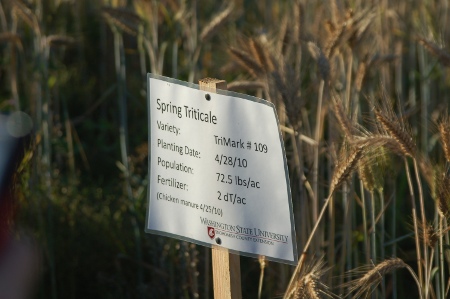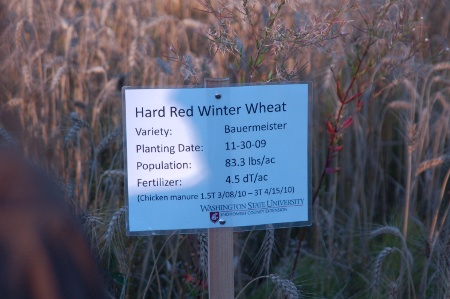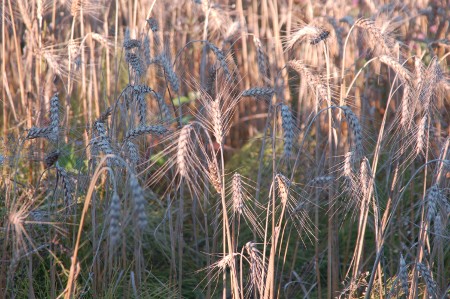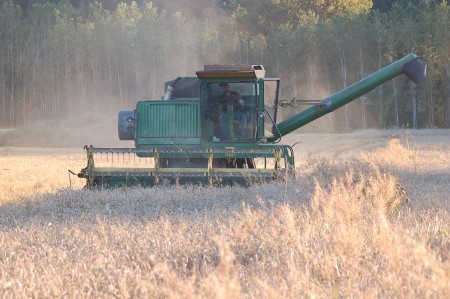A number of Tom’s tomato and potato growing trials are hosted by Chinook Farms CSA, in western Washington State. As it turned out during the first evening of my visit a number of grain related presentations and demonstrations were hosted onsite.
Western Washington isn’t an area with a lot of grain farms. It’s mostly considered unsuitable for grains, but Eric Fritch and his wife who run Chinook Farms CSA are trying to change that. They feel there is a market in the area for small scale artesian grains to be grown, and in effect they are trying to get grain farming in the area started from scratch.
Their farmland previously had cedar trees, I guess grown for lumber or other wood materials. These were recently cleared to make room for the farm, but this left the ground very nitrogen poor. Grains need nitrogen in order to build up protein in the grain. Grains need a minimum protein content to be suitable for breads, and without enough protein the grains can only be sold as animal feed.
However, a high nitrogen fertilizer given too early in the plant life-cycle of the grains, will result in more seed heads and poorer quality grain. Therefore if fertilizer is to be added, it has to be added later, after the seed heads have formed. Part of these trials was therefore to test when and how much nitrogen to apply and at what stage in plant development. This is why you see this so clearly displayed on the signs.
One of the problems discussed during this evening’s presentations was a lack of locally available grain processing equipment, especially suited for small scale production.
They demonstrated the combine used on the farm, something that was bought used for around US$4000, I think. It was pointed out that anyone trying to do something with grains on a less-than-farm scale, wouldn’t be able to use something like that. For example, someone with a large suburban lot garden. How are you going to get something like that up your driveway?
It turns out there are smaller combines available on the market, but the cost is roughly 10 times that of the larger one and they have to be imported from Italy. Since such a machine would only be used for a few hours per year, it would be a hard purchase to justify for the average person.
Also discussed was the need for grain processing equipment like hullers, which also have similar high costs together with a relatively few number of hours of use per year.
It all makes growing grains on a small scale very expensive, unless a number of farmers and small scale growers work together and share costs.
A combine has 1 million moving parts, and makes quite a bit of noise and stirs up a lot of dust as it goes!
One of the things Tom and I talked about was his interest in getting into breeding of grains. In particular, he talked about the problems of getting old varieties of grains out of gene banks.
If you make a request for a sample of an old grain from a genebank, as a rule they will only give you a few grams. If you grow this sample, after the first year if all goes well, you’ll probably have several hundred grams. If you regrow this, a few kilograms after the second year. So it won’t be until the 3rd or even 4th year of regrowing these samples that you will have enough to do a proper trial, and if you have a crop failure in the meantime you have to start over.
Doing these initial plantings and replantings is quite expensive and labor intensive. It’s requires a lot of personal care and attention, and like I talked about above involves a lot of short term use of expensive equipment, as well as probably a lot of manual harvesting with a scythe.
For older varieties that can be purchased in bulk, and there are a few of these, this is a possible alternative. Most of the older varieties however are not available for bulk purchase, and neither is it economically feasible to make these available for sale.
If someone doesn’t take it upon themselves to do or fund these initial grow-outs of old grain varieties, it won’t be possible in 5-10 years time to be able to do trials and commercial scale plantings of old grain varieties. This is just a fact.







